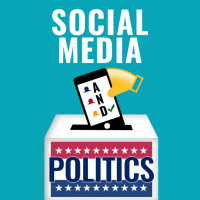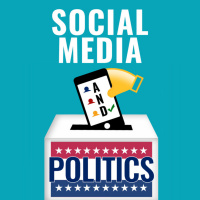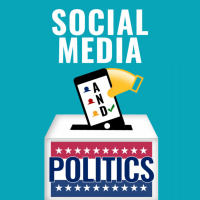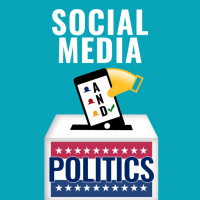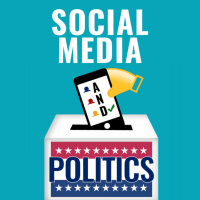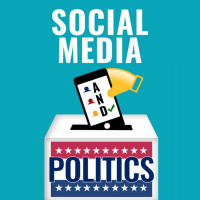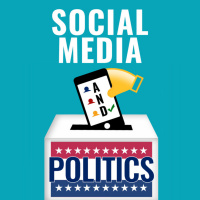Synopsis
Social Media and Politics is a podcast bringing you innovative, first-hand insights into how social media is changing the political game. Subscribe for interviews and analysis with politicians, academics, and leading digital strategists to get their take on how social media influences the ways we engage with politics and democracy. Social Media and Politics is hosted by Michael Bossetta, political scientist at the University of Copenhagen. Check out the podcast's official website: https://socialmediaandpolitics.org.
Episodes
-
Character Assassination, Reputation Politics, and Social Media in Russia, with Sergei Samoilenko
18/09/2017 Duration: 39minSergei Samoilenko, co-founder of the Character Assassination and Reputation Politics (CARP) Research Lab at George Mason University, shares his insights on how social media is used as a tool for defamation and crisis communication. We also discuss the state of the internet and social media in Russia, bots and trolls, and the Ukranian crisis. Check out their report: Character Assassination in Theory and Practice. Don't miss Tom Moylan's review of the podcast, and please take 5 minutes for the audience survey!
-
Participation, Social Media, and the Cyprus conflict, with Dr. Nico Carpentier
20/08/2017 Duration: 49minPlease take 5 minutes to take the Audience Survey! And while you're at it, check out our episode on Podcast of the Day! Dr. Nico Carpentier, Professor at the Department of Informatics and Media at Uppsala University, guests on the podcast this week to discuss media, participation, and conflict in Cyprus. We discuss deliberative versus participatory democracy, as well as Dr. Carpentier's new book, "The Discursive-Material Knot: Cyprus in Conflict and Community Media Participation".
-
Policing through Facebook: Social Media and Law Enforcement, with Kenneth Hampton
13/08/2017 Duration: 32minKenneth Hampton, former Chief of Police in Tchula, Mississippi, joins the podcast to discuss his style of law enforcement, which draws heavily on the use of Facebook. Kenneth discusses how he's used Facebook successfully to curb crime, the controversy he faced surrounding his social media use, and how important his Facebook community is to his job. You can check out Kenneth's Facebook pages, New Southern Justice and Tchula Police Department. The article from the Guardian featured in the intro can be found here.
-
Radicalization and Foreign Fighters: The Story of Lukas, with Karolina Dam
06/08/2017 Duration: 01h19minKarolina Dam, founder of the NGO Sons and Daughters of the World, joins the podcast this week to tell the story of her son, Lukas. Lukas is a Danish citizen who became radicalized in Copenhagen, fled to Syria, and joined ISIS. We discuss how Facebook groups are used to recruit potential terrorists, the role that social media can play in deradicalization, and the types of communication that take place between a foreign fighter and his mother.
-
Political Talk on Social Media: Helping or Hurting Democracy?, with Dr. Scott Wright
30/07/2017 Duration: 50minDr. Scott Wright, Senior Lecturer in Political Communication at the University of Melbourne, joins the pod to discuss what citizens' everyday political talk on social media and other online forums means for democracy. D.r Wright shares findings from his research that the design of online forms, and the level of moderation on them, have a demonstrable impact on the quality of democratic debate that occurs within these online, 'Third Spaces.' Tune in to find out more! You can follow Dr. Wright on Twitter @Scott_Wright1
-
Gab: The Free Speech Social Network, with Utsav Sanduja
16/07/2017 Duration: 51minGab is an upstart social network with over 200,000 users that does not censor its users' content. Utsav Sanduja, Gab's Chief Communications Officer and Global Affairs Director, joins the podcast to discuss what this social media is all about and addresses some of the recent controversies surrounding it. We discuss how Twitter and Facebook have been censoring users' content, the role of Gab in supporting free speech online, and what Gab's position is on bots and fake news. Utsav also talks about the choices made in developing the site's features, what's next for the Gab, and the social network's ambitions to go foster a global community.
-
Citizen Marketers and the Bernie Sanders Campaign on Social Media, with Dr. Joel Penney
09/07/2017 Duration: 52minDr. Joel Penney, Associate Professor in the School of Communication and Media at Montclair State University, discusses his new book *The Citizen Marketer: Promoting Political Opinion in the Social Media Age*. The book explores how everyday citizens actively assist in the promotion of political messages through their social media activity, following logics of viral marketing to enact persuasion at a peer-to-peer level. Dr. Penney shares his research on the Bernie Sanders campaign and the role that citizens played on social media, and Facebook in particular, to help the campaign get out its message through official and unofficial channels. Purchase a copy of The Citizen Marketer: Promoting Political Opinion in the Social Media Age on Amazon here. Follow Dr. Penney on Twitter @professorpenney.
-
The UK's New Digital Left: Paid Social, Civic Tech, and Mobilizing the Youth Vote, with Samir Patel
02/07/2017 Duration: 28minSamir Patel, Managing Director at Blue State Digital London, guests this week to discuss how the recent success of the Labour Party in the 2017 British elections was aided by a huge push in digital by the British Left. We discuss the role that Facebook data targeting played in the election - not just from Labour but also advocacy groups. Samir also explains how social media was used to mobilize the British youth vote, how citizens built their own digital tools to campaign (i.e. civic tech), and some transnational differences (and similarities) between campaigning in the United States, United Kingdom, and other parts of the European Union. We also talk about how Brexit and the upcoming negotiations may affect data privacy laws and campaign regulations. The article that I mention in the introduction can be found on Blue State Digital's website here.
-
Who's Targeting You? Facebook Dark Ads in the British Election Campaign, with Sam Jeffers
25/06/2017 Duration: 29minThe Social Media and Politics Podcast is a podcast bringing you innovative, first-hand insights into how social media is changing the political game. Subscribe for interviews and analysis with politicians, academics, and leading industry experts to get their take on how social media influences the ways we engage with politics and democracy. Connect with us on Twitter @SMandPPodcast & Facebook: Social Media and Politics Podcast In this episode, Sam Jeffers, co-founder of Who Targets Me, joins the podcast to discuss how sponsored Facebook ads were used by political parties in the 2017 British General Election. Who Targets Me is a project collecting targeted Facebook ads via a Google Chrome extension, and its aim is to shed light on who's posting political dark ads as well as who's being targeted. We discuss the project and what the initial data shows from GE2017. You can follow Sam on Twitter @wrklsshrd.
-
How Social Media Affects Engagement with Civic and Political Life, with Dr. Shelley Boulianne
18/06/2017 Duration: 29minThe Social Media and Politics Podcast is a podcast bringing you innovative, first-hand insights into how social media is changing the political game. Subscribe for interviews and analysis with politicians, academics, and leading industry experts to get their take on how social media influences the ways we engage with politics and democracy. Connect with us on Twitter @SMandPPodcast & Facebook: Social Media and Politics Podcast Dr. Shelley Boulianne, Associate Professor in Sociology at MacEwan University, joins the show to share insights from her research on how social media is impacting citizens' engagement in civic and political life. Dr. Boulianne discusses the findings of her meta-analysis studies, comparing the results of existing research in order to better uncover how social media is affecting citizens engagement with politics. You can follow her on Twitter @DrBoulianne. Check out Dr. Boulianne's full research paper that we discuss in the podcast: "Revolution in the making? Social media effe
-
The 2017 British Elections on Social Media, with Dr. Anamaria Dutceac Segesten
10/06/2017 Duration: 52minHost Michael Bossetta and Dr. Anamaria Dutceac Segesten discuss parties and citizens used social media to campaign in the 2017 UK General Elections, where Theresa May's gamble to call a snap election backfired on her Conservative Party. We break down the election results and their implications for Brexit. We also look at how Facebook, Twitter, Instagram, and Snapchat were used by the major parties and their supporters during the campaign.
-
Donald Trump and Scott Walker's Digital Strategy on Social Media, with Matthew Oczkowski
29/05/2017 Duration: 40minThe Social Media and Politics Podcast is a podcast bringing you innovative, first-hand insights into how social media is changing the political game. Subscribe for interviews and analysis with politicians, academics, and leading industry experts to get their take on how social media influences the ways we engage with politics and democracy. Connect with us on Twitter @SMandPPodcast & Facebook: Social Media and Politics Podcast This episode has been featured in the Financial Times. Matthew Oczkowski, Head of Product at Cambridge Analytica, joins the show to discuss his experience heading digital strategy for the Scott Walker primary campaign and Donald Trump general election. We discuss how the candidates used Snapchat and other social media, the differences between primary and general election campaigning in terms of digital strategy and marketing, and we also discuss how microtargeting works in practice. You can follow Matt on Twitter @MattOczkowski. The following shownotes are taken from a blog post a
-
Snapchat and the Marco Rubio Campaign, with Eric Wilson
22/05/2017 Duration: 39minEric Wilson, Digital Director for the Marco Rubio for President campaign, guests on the podcast to discuss how the Rubio campaign used social media in the 2016 U.S. presidential elections. We focus on Snapchat and discuss how the platform was used to reach voters, how the campaign crafted Snapchat stories, and where Snapchat fit into the campaign's overall social media strategy. Eric also discusses how Snapchat was used to promote a 'Vote Early Day' initiative that set off media coverage and tweets from Donald Trump on Twitter, as well as how a Snapchat lens was used in the Australia federal elections the same year. You can follow Eric on Twitter, @EricWilson, and check out his weekly newsletter: www.learntestoptomize.com.
-
American Politics and Social Media, with Dr. Alan Rosenblatt
15/05/2017 Duration: 53minDr. Alan Rosenblatt, Director for Digital Research at Lake Research Partners and Senior Vice President of Digital Strategy at Turner4D, shares his insights into how politicians have historically used the internet to campaign, going back to the first campaign website. We discuss how social media influences campaigns and advocacy, the current state of opinion polling, and the 2016 U.S. elections between Hillary Clinton and Donald Trump.
-
The French Elections and Social Media Part 2: Le Pen versus Macron and Predicting Election Outcomes, with Dr. Antoine Bevort
04/05/2017 Duration: 44minDr. Antoine Bevort, Professor Emeritus of Sociology at le Cnam, gives his take on what a Marine Le Pen or Emmanuel Macron victory in the French elections would mean for France. We discuss Dr. Bevort's research into how social media can be a predictor for public opinion, and we also touch upon how bots and fake accounts fit into the sociology theory of social capital. You can find out more about Dr. Bevort and his research at www.antoinebevort.blogspot.com
-
The French Elections and Social Media Part 1: What News are Citizens Sharing on Social Media?, with Daniel Fazekas
01/05/2017 Duration: 01h05minDaniel Fazekas, founder of Bakamo Social, discusses the findings of his recent research into the French social media landscape leading up to the 2017 French presidential election. We discuss what types of news sources French citizens are sharing, Russian influence on the elections through social media, and the polarization of news consumption patterns among the public. You can download a copy of the study, 'French Election Social Media Landscape', by visiting www.bakamosocial.com You can also follow Daniel on Twitter @fazekasdani
-
World Leaders on Instagram: Governing through Photography, Selfies, and Live Stories, with Matthias Luefkens
23/04/2017 Duration: 33minMatthias Luefkens, Managing Director of Digital Strategy for EMEA countries at Burson-Marsteller, comes on the podcast to discuss his 'World Leaders on Instagram 2017' Twiplomacy study, which examines the ways governments and heads of state are using Instagram. We discuss some of the findings of the study, including who has the most followers and drives the most engagement, and we also chat about how politicians and institutions are using the Instagram Live Stories feature in the early stage of adoption. Matthias places world leaders' use of Instagram in context by also sharing insights from his research on other social media platforms like Facebook, Twitter, Snapchat, YouTube, Periscope, and Vine. You can find all these studies at www.Twiplomacy.com
-
Dark Social Media like WhatsApp, Facebook Messenger, and WeChat: What do they mean for Politics and Marketing?, with Paul Hurley
17/04/2017 Duration: 35minPaul Hurley, digital marketing expert and founder of Frictionless Social, guests this week to discuss how Dark Social networks may be influencing politics. Paul discusses how platforms like WhatsApp, Facebook Messenger, WeChat, and others can be used by politicians and political campaigns, and we talk about how these networks may have effected the outcome of Brexit and the election of Donald Trump. Paul highlights how communication in Dark Social networks tends to be more honest, among close friends or those with a shared interest, and may build strong communities of users that can mobilize politically.
-
Social Media and Politics in Nigeria, with Yomi Kazeem
10/04/2017 Duration: 29minYomi Kazeem, a Lagos-based writer of politics, entrepreneurship, and sports business, joins the podcast to share his insights on social media's impact on politics in Nigeria. We discuss the role of social media in the latest 2015 Nigerian elections, and how Twitter was used by citizens to guard against government manipulation of the vote. Yomi also brings up the topic of dual sim cards, elaborates on NIgeria's data infrastructure, and explains how political leaders have a love/hate relationship with social media. You can follow Yomi on Twitter and Instagram @TheYomiKazeem.
-
Challenging Nancy Pelosi for Congress: Social Media's Role in Grassroots Campaigning, with Preston Picus
02/04/2017 Duration: 36minPreston Picus, an educator and coach who challenged Nancy Pelosi in California’s 12th Congressional District, guests to discuss the role that social media played in his running his grassroots, progressive campaign. Mr. Picus highlights some of the disadvantages facing an average citizen running for office against an established politician, shares his experiences using Facebook for digital advertising, and gives his take on why Twitter is less effective than Facebook for campaigning. We also discuss how the Bernie Sanders had similar struggles against the establishment favorite, Hillary Clinton, in obtaining the Democratic nomination for the 2016 U.S. Presidential Elections. You can follow Preston's still active campaign site on Facebook at Preston Picus for Congress.


